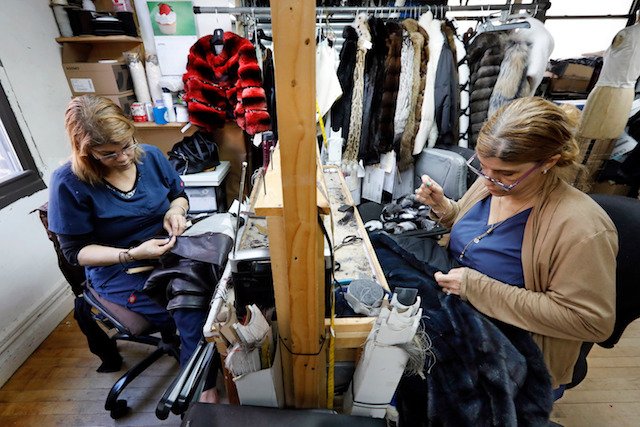Opponents Of Proposed Fur Ban In NYC Warn Of Impact On Small Businesses
May 16, 2019, 3:40 p.m.
The City Council bill has activists and community leaders locked in a debate about animal cruelty and cultural traditions.

Seamstresses Sonia Genao, left, and Juana Rodrize, right, at work at Pologeorgis Furs in New York. Advocates say many businesses will go under if the fur ban goes into effect.
A City Council bill aiming to ban fur in New York City has prompted an impassioned debate concerning animal rights, the erosion of small businesses, and the preservation of cultural traditions.
In late March, City Council Speaker Corey Johnson sponsored a bill that would ban the sale of new furs. Buying used furs, as well as furs for religious customs, would still be permissible under the measure—but offenders would be fined $500 for their first violation, and $1500 for subsequent offenses. "As an animal lover, I truly think it is cruel to kill an animal for the sole purpose of people wearing a fur coat," Johnson said in a statement. "There is really no need for this. In a progressive city like ours, we need to take steps to protect animals."
Along with another bill that Linda Rosenthal recently introduced in the New York State Assembly, which proposes a statewide ban on the "manufacture, sale, display for sale, [and] trade" of fur products, the City Council bill is explicitly meant to curb animal cruelty. Activists say that animals typically killed for their fur (such as foxes) are exposed to inhumane conditions, from traps that mutilate them to being kept in small cages until they are eventually electrocuted or gassed.
The proposal has been criticized by some who say the ban discriminates against the Black community. "Opponents of fur do not understand its importance in the black community," wrote Reverend Dr. Johnnie Green, the Senior Pastor at Harlem's Mount Neboh Baptist Church, in an open letter addressed to Johnson. "They do not understand that we have a long history of wearing furs passed down through our families for generations. They do not understand the role of fur as a symbol of achievement in society for our disadvantaged group. Our ability to wear fur historically has been a sign that we have finally become a part of New York society, something we were prevented from being a part of for hundreds of years." Hasidic leaders have also spoken out against the ban, citing the use of fur hats on the Sabbath.
Hundreds of people opposed to the bill gathered in front of City Hall Wednesday in advance of a City Council hearing, warning that the bill would kill thousands of local jobs and put numerous small companies out of business.
“When my father came to the United States from Nazi-occupied Greece, he dreamed of a better life for his family," Nick Pologeorgis, the owner of Pologeorgis Furs, told Gothamist in an email. "Over 50 years later and our family business has grown into a thriving enterprise providing for our employees and their families. From my factory employees to the people I buy lining supplies from, a fur ban would have devastating effects; and would only be the start."
safaree speaking out against the fur ban 😭 pic.twitter.com/R3p8So3dwj
— doreen st. félix (@dstfelix) May 15, 2019
Safaree Samuels, the rapper and star of Love & Hip Hop, joined the protest, telling the NY Times, “My stylist let me know about it and I was like, a fur ban in New York City? How could they do that in one of the fashion capitals, if not the fashion capital, of the world?"
But animal rights advocates—including Project Runway's Tim Gunn—hold that the process of obtaining said furs is inhumane.
"The fashion business has a troubling history with animals, but it is quickly evolving,” Gunn testified at the hearing. Big-name fashion empires including DKNY and Gucci have moved away from using fur in recent years. A handful of cities on the west coast, including San Francisco and Los Angeles, have instituted similar bans on fur sales as well.
According to FurNYC, New York City is the largest retail market for fur in the United States. Fur has long been central to the city's cultural and economic fabric. A section of midtown Manhattan known as the Fur District once had dozens of sellers hawking furs (some buildings in the area pay homage to animals central to the fur business). And as the New York Times notes, the city's official seal features beavers, whose pelts helped spur the early fur trade.
It remains to be seen how the rest of City Council feels about the bill. The same goes for Mayor and now-presidential hopeful Bill de Blasio. “I am humanly sympathetic to folks in that industry because it is a loss of jobs,” de Blasio has said in the past. “I don’t belittle the concern. If something happens here, there has to be some sense of how to phase it in in a way that really does try to protect some jobs.
However, the mayor added that he agrees with "the impulse of that legislation."